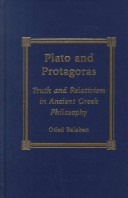Are human beings antithetical in nature? Is there a radical difference between pleasure, efficiency, and moral good, or is the conflict only imaginary? These have traditionally been considered the central questions of Plato's most vivid dialogue, the Protagoras. Many interpreters have seen this dialogue as a confrontation between the moralist (Plato) and the relativist (Protagoras). This dichotomy is manifest when Plato and Protagoras discuss theoretical questions concerning either knowledge of facts or knowledge of values. Through a careful examination of the text, specifically of practical questions about values, Oded Balaban breaks with tradition by concluding that Plato and Protagoras do not exemplify characteristic moralism or relativism at all. He finds that the issue at the crux of the discussion is instead that of the criterion for knowledge and valuation; the Protagoras thus describes the search for a standard by which anything may be known and valued. Balaban applies the fundamental question of standards to that of the entire field of rhetoric: Should a discourse be short or long, simple or complex? What is the standard for conducting literary criticism? The author's revolutionary approach to the Protagoras also involves a study of the myth of Protagoras and situates the dialogue within its framework.
- ISBN10 0739100750
- ISBN13 9780739100752
- Publish Date 6 October 1999
- Publish Status Out of Print
- Out of Print 13 March 2021
- Publish Country US
- Imprint Lexington Books
- Format Hardcover
- Pages 368
- Language English
